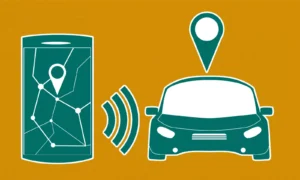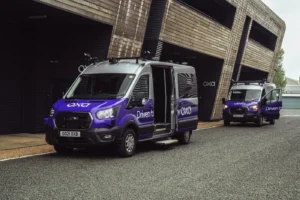The first Autonomous Vehicle passenger service pilot in Scotland is underway. The driverless pod is based at Inverness Campus and will carry passengers around the site until March next year.
The regional transport partnership for the Highlands and Islands, HITRANS, is promoting the service, saying it is committed to encouraging multi-modal travel and moving away from private car use. HITRANS has attracted European funding – through the Planning for Autonomous Vehicles project, funded by the Interreg North Sea Region Programme – and is working with a number of partners to deliver the project. These include Stagecoach, who will operate the service, NAVYA, who manufactured the AV, The Highland Council and Inverness Campus.
The AV passenger service provides a two mile route linking Inverness Campus with the Inverness Retail and Business Park, including a railway crossing facilitated a the recently introduced sustainable travel bridge. The corridor is restricted to public transport, walking, and cycling only, with those walking and cycling segregated from road vehicles across most of the route.
One vehicle is operating on the route carrying up to 15 passengers, 11 seated and 4 standing. The team behind the trial expect that the shuttle service will be used by students and people working on the Inverness Campus site to access the neighbouring Shopping and Business Park throughout the day. Partners say they are keen to see the services used as much as possible throughout the trial and will look to work with schools to support school visits to allow young people to travel on the service. Those schools interested should contact: [email protected]. In this initial period, the Autonomous Vehicle is operating on a shuttle basis from 10am until 4 pm and no fares will be charged for a special introductory period until 1 October.
The trial is seen as complementary to a project in Hannover, Germany, where trialling an autonomous bus shuttle between a tram stop and a new university campus is being undertaken.
Monitoring will be conducted throughout the pilot on various technological aspects as well as social impacts. The intention of the pilots is not only to test the viability of a route operated by an AV, but also to test the technology required to use AVs in combination with other transport modes and better understand user perceptions. Dedicated work streams have therefore been developed to focus on the long-term socio-economic impacts of AVs, with research validated using pilot project results.
Scottish Minister for Transport Jenny Gilruth said: “We want Scotland to be at the forefront of the Connected Mobility and Autonomous Vehicle industry and this pilot project is another exciting development. This type of innovation shows Scotland is very much open for business when it comes to trialling this technology. I wish Inverness Campus, HITRANS and project partners every success with this pilot.”
Councillor Ken Gowans, Chair of The Highland Council’s Economy and Infrastructure Committee, added: “The Inverness Campus is an ideal location to trial such a technologically advanced form of transport. I found the ride felt very safe and enjoyable and the other passengers were impressed too. The bus travels at around twice the speed of walking and will be ideal for localised journeys such as shuttle services, and much more as the technology develops.”
Jayne Golding, Projects and Policy Manager, HITRANS, commented: “Safety is paramount to the project and all UK regulation relating to autonomous vehicles will be complied with. While the vehicle might be capable of driving itself without being controlled by an individual, an operator will be always present in the vehicle. The driving task will be delegated to the vehicle, but the operator will be ready to take control whenever they are required to do so.”
Donald Hall, Travel and Transport Manager for Inverness Campus was appointed last year by Campus developer, Highlands and Islands Enterprise (HIE) to expand the range of active and green travel initiatives leading to and from Inverness Campus. He said: “We are looking forward to hosting this innovative trial at Inverness Campus where a range of other sustainable travel initiatives are already underway. The Campus is an ideal location for this trial with a high-quality multi-use environment that is enjoyed by businesses, research organisations, students and local residents.”
David Beaton, Managing Director for Stagecoach Highlands, said: “As a company with innovation firmly at our heart, we are very excited to be involved in the pilot of the autonomous technology in Inverness. Autonomous vehicle technology can provide major benefits, with evidence suggesting that it can further enhance safety, deliver fuel and efficiency savings from more optimised braking and acceleration, as well as a better overall customer experience. Through the pilot at Inverness Campus, and the major trial we are leading in East Scotland which will see the country’s full-sized autonomous buses operating over the Forth Road Bridge, we are learning a lot about this new technology and how it could be used to benefit the communities we serve.”
Sophie Desormière, CEO of Navya, concluded: “Navya is proud to contribute to the deployment of the autonomous shuttle pilot project in Scotland. I would like to thank all our partners involved in this project,that puts innovation at the heart of local ambitions to become ever more attractive and accessible. Providing shared and zero-emission autonomous transport solutions to promote multimodal ways of travel, reducing the need for personal vehicles, represents a major push to cities’ economic and tourist activities while contributing to their energy and ecological transition. The NAVYA shuttles, which are constantly improving thanks to our strong global footprint of over 200 vehicles sold, facilitate a model of mobility for all, through concrete, flexible and safe services provided to users.”
(PIcture – Highland.gov.uk)
























